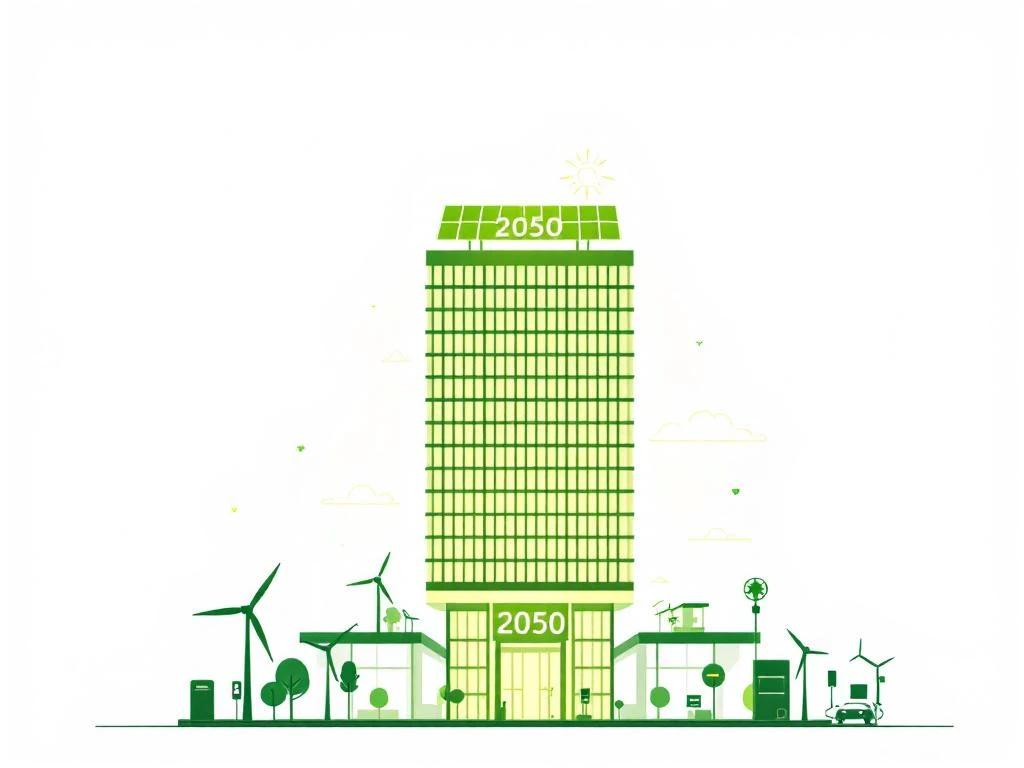
Andres Fellenberg Van der Molen
Director at Green Partner Europe | Hotels Specialist | Sustainability | Energy Efficiency | Circular Economy | Zero Waste | CSR | ESG | SDG

How can my hotel achieve net zero carbon emissions by 2050?
Hotels can achieve net zero carbon emissions by 2050 through a systematic approach combining energy efficiency improvements, renewable energy adoption, comprehensive carbon footprint measurement, and strategic sustainability certification. This transformation requires professional sustainability consultancy guidance to navigate European regulations, implement proven carbon reduction strategies, and engage guests in environmental initiatives whilst maintaining service excellence.
Understanding the path to net zero carbon emissions for hotels
The journey towards carbon neutral hotel operations represents a fundamental shift in how the hospitality industry approaches environmental responsibility. Net zero carbon emissions means achieving a balance between the carbon dioxide produced through hotel operations and the amount removed from the atmosphere through offsetting measures and sustainable practices.
For hotels, this transformation is particularly crucial given the industry’s significant environmental impact through energy consumption, waste generation, and resource usage. The 2050 target aligns with global climate commitments and increasingly stringent European regulations, including the Corporate Sustainability Reporting Directive (CSRD) and European Sustainability Reporting Standards (ESRS).
Professional sustainability consultancy becomes essential in navigating this complex transformation. Expert guidance ensures hotels implement scientifically-backed strategies whilst maintaining operational efficiency and guest satisfaction. This comprehensive approach addresses everything from initial carbon auditing to long-term monitoring and reporting requirements.
What does net zero carbon emissions mean for the hospitality industry?
Net zero carbon emissions in hospitality means balancing all greenhouse gases produced by hotel operations with equivalent amounts removed from the atmosphere. This goes beyond simply reducing emissions to achieving complete carbon neutrality across all operational aspects.
For hotels, this encompasses direct emissions from heating, cooling, and on-site energy generation, alongside indirect emissions from purchased electricity, waste disposal, and supply chain activities. The hospitality sector faces unique challenges due to 24/7 operations, guest comfort requirements, and diverse service offerings that all contribute to the overall carbon footprint.
Achieving net zero requires hotels to first dramatically reduce emissions through efficiency improvements and renewable energy adoption, then offset remaining emissions through verified carbon removal projects. This holistic approach ensures genuine environmental impact rather than superficial greenwashing efforts.
How can hotels measure their current carbon footprint accurately?
Accurate carbon footprint measurement begins with comprehensive data collection across all hotel environmental impact sources. Professional carbon audits examine energy consumption patterns, waste generation, water usage, transportation, and supply chain emissions to establish baseline measurements.
Hotels must track both direct emissions from on-site activities and indirect emissions from purchased utilities and services. This includes monitoring electricity and gas consumption, fuel usage for vehicles and equipment, waste disposal methods, and even guest travel patterns where applicable.
Modern carbon accounting software and professional auditing services ensure accuracy and compliance with international standards. Regular monitoring establishes trends, identifies improvement opportunities, and provides the data foundation necessary for setting realistic reduction targets and measuring progress towards net zero goals.
What are the most effective strategies for reducing hotel carbon emissions?
The most impactful carbon footprint reduction strategies focus on energy efficiency improvements as the foundation for sustainable hospitality operations. LED lighting systems, smart HVAC controls, and building automation technologies can reduce energy consumption by significant amounts whilst maintaining guest comfort.
Renewable energy adoption represents another crucial strategy, with solar panels, heat pumps, and green energy procurement contracts directly replacing fossil fuel dependency. Hotels can also implement comprehensive waste reduction programmes, sustainable procurement practices, and water conservation measures to address indirect emissions.
Operational changes such as linen and towel reuse programmes, energy-efficient appliances, and staff training on sustainability practices create ongoing emission reductions. These strategies work synergistically, with energy efficiency improvements reducing the scale of renewable energy systems needed for complete carbon neutrality.
Which sustainability certification is best for hotels pursuing net zero goals?
When comparing sustainability certifications for hotels pursuing net zero carbon emissions, EarthCheck certification stands out as the most comprehensive and effective framework. EarthCheck provides the most thorough approach to measuring, monitoring, and reducing environmental impact across all hotel operations.
EarthCheck’s scientific methodology includes detailed carbon footprint assessment, energy efficiency benchmarking, and continuous improvement tracking that directly supports net zero objectives. The certification covers all aspects of sustainable hospitality operations, from energy and water management to waste reduction and community engagement.
Unlike other certifications that may focus on specific areas, EarthCheck provides integrated solutions that address the full spectrum of environmental challenges hotels face. This comprehensive approach ensures hotels develop robust sustainability management systems capable of achieving and maintaining carbon neutrality through 2050 and beyond.
How do renewable energy solutions help hotels achieve carbon neutrality?
Hotel energy efficiency combined with renewable energy adoption creates the foundation for carbon neutral operations. Solar photovoltaic systems can provide substantial portions of hotel electricity needs, particularly effective for properties with adequate roof space or land availability.
Heat pump technologies offer efficient alternatives to traditional heating and cooling systems, whilst solar thermal systems can provide hot water for guest rooms and facilities. Hotels can also participate in renewable energy procurement programmes, purchasing green electricity from off-site renewable sources when on-site generation isn’t feasible.
Battery storage systems enhance renewable energy effectiveness by storing excess generation for use during peak demand periods. This integration of multiple renewable technologies, combined with energy efficiency improvements, enables hotels to eliminate fossil fuel dependency and achieve genuine carbon neutrality.
What role does guest engagement play in hotel carbon reduction efforts?
Guest engagement represents a significant opportunity for green hotel practices that extend environmental benefits beyond operational improvements. Educational programmes help guests understand their environmental impact whilst staying at the property, creating awareness that often extends to their home behaviours.
Practical engagement strategies include optional linen and towel reuse programmes, energy conservation reminders, and participation in local environmental initiatives. Hotels can provide information about public transportation options, bicycle rentals, and local sustainable attractions to reduce guest transportation emissions.
Digital platforms enable hotels to share sustainability achievements and goals with guests, creating transparency and encouraging participation. Many guests actively seek environmentally responsible accommodation options, making sustainability engagement a competitive advantage that supports both environmental goals and business success. For hotels looking to develop comprehensive guest engagement strategies, sustainable hospitality insights provide valuable guidance on implementing effective programmes.
Key takeaways for achieving hotel net zero carbon emissions by 2050
Successfully achieving net zero carbon emissions requires hotels to begin immediate action with comprehensive carbon footprint assessment and strategic planning. The timeline to 2050 demands systematic implementation of energy efficiency improvements, renewable energy adoption, and operational changes that reduce environmental impact.
Professional sustainability consultancy proves essential for navigating complex European regulations, selecting appropriate certification frameworks, and implementing scientifically-backed reduction strategies. Hotels must balance environmental objectives with operational requirements and guest satisfaction to ensure long-term success.
The transformation to carbon neutrality represents both an environmental imperative and a business opportunity. Hotels that proactively address climate change through comprehensive sustainability programmes position themselves advantageously for future regulations, guest preferences, and operational cost savings that support long-term profitability alongside environmental responsibility.
